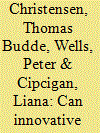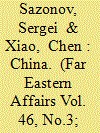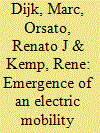|
|
|
Sort Order |
|
|
|
Items / Page
|
|
|
|
|
|
|
| Srl | Item |
| 1 |
ID:
175244


|
|
|
|
|
| Summary/Abstract |
Italy has a very low level of uptake of electric cars (ECs), equal to 0.6% for the year 2019, despite significant efforts put in place by policy makers to stimulate their use. This paper investigates the barriers to wider EC diffusion via a survey administered in 2019 to a representative sample (N = 870) of the Italian population. We discuss and rank the barriers, aggregate them via principal component analysis (PCA) on the basis of the polychoric correlation matrix, perform a cluster analysis and analyse the socio-economic determinants of the respondents. The findings of this paper suggest a series of improvements that could be made by various actors. To overcome the financial barriers to EC uptake, Italian policy makers should reinforce incentives at the national and local levels and car manufacturers should bring to the market cheaper ECs belonging to the A and B segments. The charging-related barriers require investments on fast charging stations along the main toll highways and a new regulation regarding multi-house dwellings. Finally, reliable and complete information is needed to enhance knowledge about the technological and environmental pros and cons of ECs.
|
|
|
|
|
|
|
|
|
|
|
|
|
|
|
|
| 2 |
ID:
115148


|
|
|
|
|
| Publication |
2012.
|
| Summary/Abstract |
This paper explores the geographical and policy context for an emergent business model from Better Place to deliver battery electric car mobility in Denmark. It argues that the combination of radically different technologies and a highly complex multi-agency operating environment theoretically provide the conditions and requirements for such an emergent business model. While focused on battery electric cars, renewable energy generation and smart grids, the paper has wider applicability to an understanding of the interplay between place, innovation and sustainability which suggests that diverse solutions are likely to be the characteristic solution rather than ubiquity and standardization. The paper argues, however, that the innovative business model, the deployment of electric vehicles, and the use of renewable energy systems, in this case largely based on wind power, while mutually supportive and contributing to wider policy aims with respect to the reduction of carbon emissions, may still fail in the face of entrenched practices. At the theoretical level it is concluded that theorization of business models needs a broader perspective beyond the typical 'value creation, value capture' rubric to better understand the wider role such models have in meeting societal goals, and to understand the structural impediments to organizational and technical innovation.
|
|
|
|
|
|
|
|
|
|
|
|
|
|
|
|
| 3 |
ID:
162795


|
|
|
|
|
| Summary/Abstract |
China's rapid economic development over the past three decades has multiplied power consumption, while the population's income growth has stimulated a dramatic increase in the production and sales of cars. These factors have increased the country's dependence on imports of petroleum products and deteriorated the environmental situation in the PRC. Being aware of these challenges, the government is radically reorganizing the automotive industry on the basis of new energy, creating an innovative motor vehicle fleet and corresponding new-generation infrastructure.
|
|
|
|
|
|
|
|
|
|
|
|
|
|
|
|
| 4 |
ID:
117231


|
|
|
|
|
| Publication |
2013.
|
| Summary/Abstract |
In this paper, we analyse the emergence of a trajectory of electric moblity. We describe developments in electric vehicles before and after 2005. The central thesis of the paper is that electric mobility has crossed a critical threshold and is benefitting from various developments whose influence can be expected to grow in importance: high oil prices, carbon constraints, and rise of organised car sharing and intermodality. We find that the development of vehicle engine technology depends on changes in (fueling) infrastructure, changes in mobility, changes in the global car market, evolution of energy prices, climate policy, and changes in the electricity sector. Special attention is given to interaction of technological alternatives: how these work out for the future of battery electric vehicles, hybrid electric vehicles and hydrogen fuel cell vehicles.
|
|
|
|
|
|
|
|
|
|
|
|
|
|
|
|
|
|
|
|
|